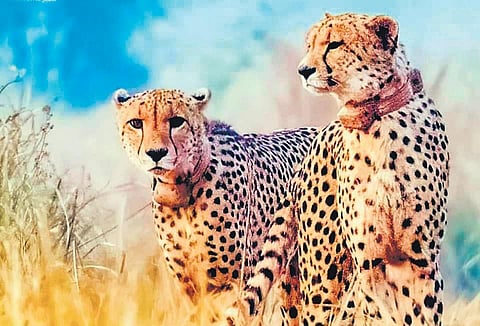

BHOPAL: Once identified as the most suitable location for reintroduction of Asiatic Lions, the Kuno National Park (KNP) in Madhya Pradesh’s Sheopur district ended up being home to African cheetahs on Prime Minister Narendra Modi’s 72nd birthday—September 17, 2022.
Seventy years after the fastest moving animal on land became extinct due to rampant hunting in the jungles of India, eight semi-adult and adult cheetahs from Namibia were translocated to India as part of the ambitious Cheetah Action Plan to reintroduce the extinct feline variety into the Indian wilds.
Five months later, 12 cheetahs from South Africa joined the Namibian felines at the same national park on February 18, 2023, taking the total cheetah strength to 20.
Nine deaths
However, between March 27 and August 2 this year, six semi-adults and three of four cubs died due to various reasons, leading to concern about their conservation. The Centre through the National Tiger Conservation Authority (NTCA) recently told the Supreme Court that the deaths were troubling but not “unduly alarming”. A joint affidavit, filed on behalf of the environment ministry and the NTCA, said the provisional diagnosis of mortality events points towards “natural causes”.
The NTCA added that it had no reason to believe the mortalities were on account of any inherent unsuitability at the Kuno site. Cheetahs in general have a very low survival rate of 50% in adults even in native species. “In the case of introduced population the survival rates are even lower taking other variables into account, which may lead to about 10% survival in cubs, and thus, mortalities (at Kuno) though troubling and in need of redressal and curtailment are not unduly alarming,” it said.
The Cheetah Action Plan itself says that even if 50% of the translocated felines survive in the first year of introduction, it would be considered successful in the short run. As of now, six of the eight Namibian cheetahs (75%) introduced in September 2022 are surviving, while at least seven out of the 12 SA cheetahs (58%) introduced in February 2023 are stated healthy in bomas while an SA female is untraceable in the jungles.
African expert’s take
However, a South African expert associated with the project had a different take. He is among the four international experts aboard the Project Cheetah Steering Committee formed by the NTCA in May. A letter signed by Prof Adrian Tordiffe, veterinary wildlife specialist from the University of Pretoria, SA, said, “Currently, 7 out of 8 cheetahs have died in enclosures and the 8th died of infection from the collar. All the 8 deaths were avoidable if there was adequate supervision, monitoring and veterinary intervention.”
Pointing to the July 11 death of an SA male, he wrote to the SC that wounds on the back of its neck were assumed by forest officers and vets to have been sustained in an altercation with a female cheetah, which was extremely unlikely. The staff left the injured male and tried to locate the female to check the possibility of injuries to her. During the interregnum, the male’s condition deteriorated and it died in the next three hours.
As for the first death outside the enclosures on July 14, one of the letters said, “We learned of it through the media and received no communication from the NTCA or the KNP management. Only at 9 pm, we finally received a video clip showing the neck and back of the deceased animal, which made it clear that the male had severe dermatitis in the area of the neck around the satellite collar. The severely inflamed skin was covered in fly larvae (maggots). The very wet weather due to above average and persistent monsoon rains caused the skin under the tracking collar to become moist, macerated and inflamed.
The discharge from the inflammation attracted flies and the maggots that hatched from the fly eggs, further damaging the skin, allowing bacteria to invade and spread, resulting in fatal septicaemia shock.” Just five days after Tordiffe sent his letter on July 15, two South African experts —Vincent Van Der Merwe and Andy Fraiser — claimed their names were used in it without consent. An email on July 20 to M K Ranjitsinh, head of committee formed by SC to assist in implementation of Project Cheetah, read: “Please know that Dr Andy Frasier and I (Vincent Van Der Merwe) were not supportive of this letter being sent to the top court. We are surprised to see our names reflecting.” July 15 letter had names of 3 other experts, including Fraiser and Merwe and Dr Mike Toft.